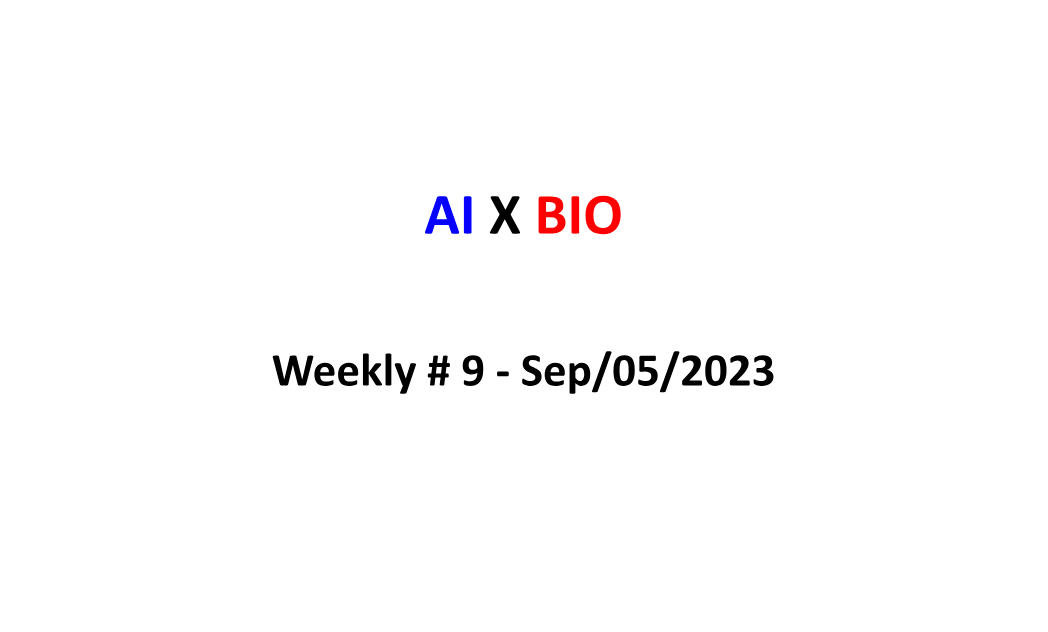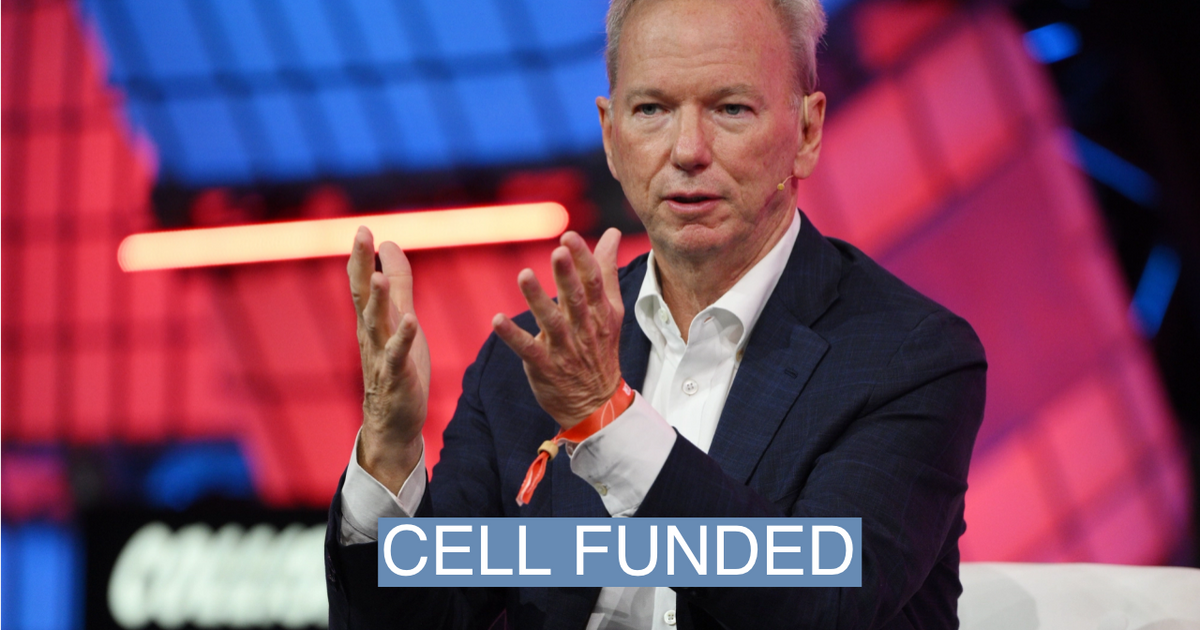- AIXBIO
- Posts
- AIXBIO Weekly #9 - Sep/5/23
AIXBIO Weekly #9 - Sep/5/23

Featured
Breakthroughs
Borzoi: A Comprehensive Model for RNA-seq Prediction
The research paper introduces "Borzoi", a groundbreaking model designed to predict RNA-seq coverage directly from DNA sequences. This model is pivotal in interpreting genetic variants, offering functional predictions that describe their impact on the cis-regulatory code. One of the primary objectives in genomics is to understand the influence of each nucleotide in the human genome concerning gene-regulatory activity. Such insights would significantly enhance researchers' capabilities to interpret pathogenic mutations and prioritize functional variants in genome-wide association studies.
Machine learning models have previously been employed to predict regulatory activity from DNA sequences with considerable success. However, Borzoi stands out by predicting RNA-seq coverage directly, offering a plethora of benefits. Unlike previous models that focused on individual regulatory functions, Borzoi captures multiple regulatory layers simultaneously, promising a more comprehensive understanding of gene regulation.
The introduction of Borzoi marks a significant stride in genomics. By predicting RNA-seq coverage directly from DNA sequences, it offers a more comprehensive understanding of gene regulation. This could revolutionize how researchers interpret genetic variants, potentially leading to breakthroughs in medical research and treatments. #Borzoi #RNA #GenomicsResearch #MachineLearning #ML #DNA #GeneRegulation #HealthcareAI
Partnerships
Google Joins Forces with Ginkgo Bioworks: A Fusion of Data and AI in Biomanufacturing
In a groundbreaking collaboration, tech giant Google has teamed up with Ginkgo Bioworks. Central to this partnership is Ginkgo's Foundry, a platform known for its advanced biomanufacturing capabilities. The collaboration aims to merge the vast reservoirs of data available with the power of artificial intelligence. By doing so, both entities aspire to bring about a transformation in biomanufacturing processes, making them more efficient, sustainable, and innovative. The joint venture is not just about harnessing technology but also about reimagining the possibilities in the realm of biological design. By leveraging AI, the partnership intends to optimize and accelerate the design processes, ensuring that the outcomes are not only effective but also environmentally friendly.
#Google #Biomanufacturing #Biotech #DrugDiscovery
HCA Healthcare and Google Cloud Team Up to Enhance Clinical Workflows with Generative AI
HCA Healthcare, a leading healthcare provider, has joined forces with Google Cloud to leverage generative AI technology in enhancing clinical documentation workflows. This collaboration aims to reduce the burden of time-consuming tasks on healthcare professionals, allowing them to concentrate more on patient care. As part of HCA Healthcare's broader digital transformation initiative, this expanded partnership with Google Cloud is pivotal. A pilot program launched earlier this year saw 75 emergency room physicians across four HCA Healthcare hospitals utilizing Google’s AI technology for efficient medical documentation. Another innovative application of this technology is in the automation of patient handoffs between nurses, a process that is traditionally manual and time-intensive. Google Cloud's robust data governance and privacy policies ensure that customers maintain control over their data, with stringent measures in place to uphold patient privacy and data security.
#HCAHealthcare #GoogleCloud #GenerativeAI #ClinicalDocumentation #HealthcareInnovation
OneOncology Adopts Verily's SignalPath to Enhance Clinical Trial Management
OneOncology deploys Verily’s SignalPath across 11 clinics, aiming to boost U.S. clinical trial participation from a mere 6%. This move may democratize trials & enhance health equity.
#OneOncology #Verily #SignalPath #ClinicalTrials #Oncology #HealthTech #CancerResearch #DigitalHealth
Ethics & Regulation
MIT Explores Biases in Machine Learning's Medical Applications
Marzyeh Ghassemi, prior to her PhD in computer science from MIT, began exploring the potential of AI techniques amplifying existing biases in healthcare. In a recent paper, Ghassemi and her team from MIT's Department of Electrical Science and Engineering delved deep into the roots of disparities in machine learning. They found that models often underperform for subgroups with limited data. The team identified four primary types of biases: spurious correlations, attribute imbalance, class imbalance, and attribute generalization.
#MITResearch #AIBias #MachineLearning #HealthcareAI #MedicalDiagnosis #FairHealthcare
Spain Aims for AI Leadership with New Regulatory Agency
Spain is taking significant steps to position itself at the forefront of the AI industry by launching a dedicated AI regulation agency. This agency is the result of collaborative efforts between the Spanish Ministry of Finance and Civil Service and the Ministry of Economic Affairs and Digital Transformation. The establishment of such an agency underscores Spain's commitment to nurturing a thriving AI ecosystem within its borders. By introducing a regulatory body, Spain aims to ensure that AI innovations and applications align with established standards, promoting both growth and ethical considerations in the AI sector.
#Spain #AIRegulation #AIEthics #GlobalAI
Foundation Models & Platforms
OpenAI introduces ChatGPT for Enterprise, focusing on security & advanced features aiming to attract large business users. While other AI platforms target businesses, ChatGPT's popularity might give it an edge. OpenAI hints at future enhancements.
The launch of ChatGPT for Enterprise signifies OpenAI's ambition to dominate the business AI market. If successful, it could reshape how enterprises interact with AI, influencing business operations and decision-making processes.
OpenAI also introduces "capped-profit" OpenAI LP, blending for-profit & nonprofit. Aimed at advancing AGI for humanity's benefit, it prioritizes mission over profits. Investors' returns are capped, with excess to OpenAI Nonprofit
Ex-Google CEO, Eric Schmidt, recently articulated his vision emphasizing the transformative potential of AI in science. He believes that the ripple effects of this transformation will extend beyond labs, influencing various sectors.
Research & Innovation
Harvard Scientists Unveil New Protein Degradation Mechanism
Researchers from Harvard Medical School have made a groundbreaking discovery regarding the mechanism by which cells break down proteins that are no longer required. These proteins, which are short-lived, play crucial roles in modulating genes that support neural, immune, and developmental processes. The newly discovered mechanism could pave the way for the design of therapies targeting conditions resulting from either an excess or deficiency of a protein. The study, published in Science on August 24, 2023, highlights the role of a protein named midnolin in degrading numerous short-lived nuclear proteins. This degradation process is distinct from the ubiquitination-dependent mechanism traditionally understood in the scientific community. The researchers are keen on delving deeper into this mechanism, with plans for structural studies and experiments involving mice lacking midnolin. This discovery holds significant translational potential, offering a pathway to control levels of transcription factors, thus modulating gene expression and associated bodily processes. Deregulation of protein degradation is linked to various disorders, including certain neurological conditions, psychiatric issues, and cancers. The team is particularly interested in diseases that could benefit from therapies targeting the midnolin-proteasome pathway.
Target Identification for RDS in Adults: RAGE
Causaly unveils an AI-driven platform for drug target identification in R&D, aiming to streamline & expedite the discovery process. It offers insights into disease mechanisms & potential drug targets
Markets
Palantir Faces Skepticism from Morgan Stanley Amid AI Hype
Morgan Stanley recently downgraded Palantir Technologies Inc., signaling Wall Street's growing skepticism towards the software company, which has been positioning itself as a major player in the artificial intelligence (AI) domain. This decision led to an 8% drop in Palantir's shares on a specific Thursday. Although the company has benefited from the widespread investor enthusiasm for AI, its stock remains below a peak achieved earlier in the month. Furthermore, it has plummeted over 60% from its highest point in 2021. Keith Weiss, an analyst at Morgan Stanley, commented that the stock's current valuation seems to be a reflection of "AI euphoria." He also highlighted that while Palantir's product introduction was previously sufficient to inspire investor optimism, the focus is now shifting. Investors are keen on distinguishing companies that can efficiently generate revenue from their AI offerings. Palantir, in this context, appears to be in its nascent stages, especially since it has openly admitted to not having a clear monetization strategy for its solution. Earlier in the month, Palantir provided a sales forecast that some market watchers found disappointing. This was particularly surprising given the company's claim that the demand for its new AI tool was "unprecedented." As a result of these factors, Morgan Stanley revised its rating for Palantir from equal weight to underweight.
#Palantir #MorganStanley #AI #ArtificialIntelligence









